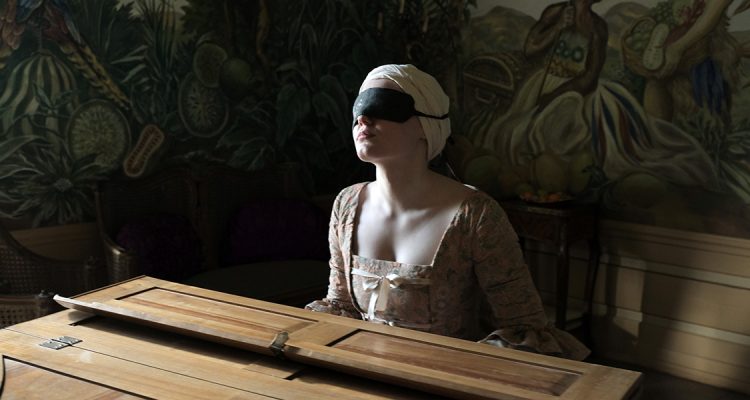The opening shot of Barbara Albert’s “Mademoiselle Paradis” is one of the most startling medium close-ups in recent memory. We see a young female pianist’s face during a musical performance, and her expression is a complex mixture of emotions: fear, concentration, exhaustion, exhilaration. Each note seems a struggle, and each movement a battle. Even if one knows nothing of the plot, or perhaps just the brief synopsis, it is easy to discern from the wig and dress that this is 17th Century Europe (Austria, to be precise), and that there is clearly something afflicting her eyes (she is blind). “Smile, Therese,” the young woman sadly tells herself upon finishing. “And don’t rock back and forth.”
She is Maria Theresia von Paradis, and the film that tells her true story is haunting, sumptuous, and immaculately directed. Making its World Premiere in the Platform program of the 2017 Toronto International Film Festival, “Mademoiselle Paradis” is a period stunner steeped in a history that’s almost too intoxicatingly strange to believe. Viewers mostly unfamiliar with the character’s story will likely rush to the internet for factual confirmation, and discovering that the woman mostly referred to on-screen as Therese really did recover her sight with the help of controversial physician Dr. Franz Mesmer makes Albert’s achievement seem even greater.
READ MORE: Peter Schønau Fog’s ‘You Disappear’ Melds Bergman With Scandi-Noir [TIFF Review]
Just as mesmerizing is the work of star Maria Dragus, a German-Romanian actress who made her film debut in Michael Haneke’s “The White Ribbon.” Also known for her work in 2016’s “Graduation,” Dragus is simply extraordinary. She captures the complexities of a figure who lost her sight at a very young age and has since been trained relentlessly to perform. One of the constants in her life is the suggestion that due to her disability, her appearance, and her gender, she is nothing without her talent. This is explicitly stated by her father, and remarked upon by those watching the performance that opens the film. “Pretty she is not. But she does play well,” says one. “Poor girl,” adds another. “How I pity her.”
After a title card states the setting as 1777 Vienna, we move to the start of Therese’s treatment by the well-known Dr. Mesmer (Devid Striesow). He was a controversial figure in Viennese society, and at first there is little reason to believe Mesmer will be any more successful than the numerous other doctors who have treated Therese. However, there is a gentleness to Mesmer’s care that is almost jarring to Therese, a prodigy so accustomed to cruelty and derisive laughter. This experience will clearly be different.
When Mesmer’s methods finally pay off, and Therese is able to see once again, the lives of all involved are upended. For Therese, gaining sight is wondrous, jarring, and physically and emotionally painful. Dr. Mesmer takes great care to remind Therese and her parents that the process will be long and difficult. But even he cannot avoid the rush to share this seemingly miraculous result with the world. Therese soon discovers that her musical skill is greatly diminished, and that there is a direct link between her blindness and her ability. Her struggles are now quite different, but they are more pronounced than ever before.
One of director Albert’s greatest strengths is her establishment of the setting and characters surrounding Therese and Mesmer. Virtually every supporting figure — most notably Therese’s chambermaid, Agnes (Maresi Riegner) — is worthy of his or her own film. Even Therese’s mother and father, Maria (Katja Kolm) and Joseph (Lukas Miko), are more than one-note villains. Their behavior is often cold and merciless, yet Albert also shows the difficulties each faced as parents in an unforgiving society. It was a cruel time, a period in which any perceived disability was cause for banishment. Unless, of course, there was some talent to compensate.
“Mademoiselle Paradis” is not, to be sure, an easy watch. The treatment of disabled children and adults is genuinely upsetting. (“Who was that?” Resi asks when a disabled boy approaches their group. “An imbecile,” her mother answers. There is a particularly unsettling late sequence involving the little boy, and the coldness that follows will greatly disturb viewers.) There are, however, numerous moments of real humor. Some of it is at Therese’s expense. “That is very beautiful,” she says at one point. “Therese, that is dung,” her authoritative mother replies, “It is not beautiful.”
If there is a failing, it is only the somewhat abruptness of its ending. The final scene is a wonderful bookend to the first, but the tale of Maria Theresia von Paradis and Dr. Franz Mesmer is so compelling, and so unsettling, that we are left wanting a bit more. That is hardly a strong criticism, however. “Mademoiselle Paradis” is the fifth film from director Barbara Albert, and for both she and star Maria Dragus, it is a stunning success. Here is a musical biopic told with passion and grace, and a TIFF entry to remember. [A-]
Click here for our complete coverage of the 2017 Toronto Film Festival

